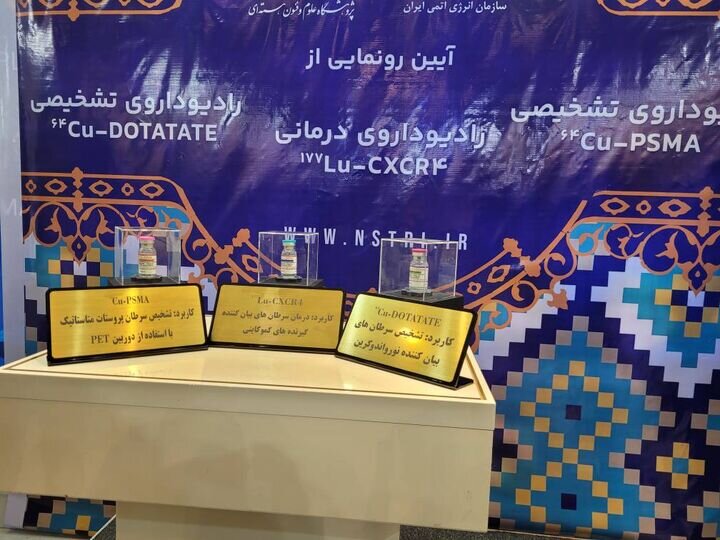Iran unveils new nuclear achievements

TEHRAN – Iran has unveiled three new radiomedicines with applications for diagnosis, prevention and treatment of a number of diseases.
The head of the Atomic Energy Organization of Iran, who was present at the unveiling ceremony held in the capital Tehran, said the new drugs bring the number of the Iranian-produced radiopharmaceuticals to 50. “10 more radiodrugs will hit the production line in the upcoming months,” Mohammad Eslami said on Tuesday.
Eslami also took the time to answer questions by reporters. When asked about the International Atomic Energy Agency’s (IAEA) latest accusations against Iran, the official said Tehran has not expelled any of the UN agency’s inspectors from the country, while emphasizing that Iran has the right to vet those seeking to enter Iranian nuclear sites.
“We have accepted about 120 inspectors, and right now, as we are speaking, two inspectors are visiting [nuclear sites] in a routine manner,” Eslami stated. He said that Iran has so far rejected to provide entry for 5 IAEA inspectors, adding that none of the individuals had entered the country to begin with.
IAEA chief Rafael Grossi claimed in September that Tehran had barred several of the organization’s inspectors from monitoring Iran’s nuclear program. He condemned Iran for its “disproportionate and unprecedented” move.
“When they introduce inspectors, we have the right to investigate, and no authority or law can impose inspections on us. The use of the phrase 'I condemn' is legally baseless,” explained Eslami.
Several of Iran’s nuclear scientists have been assassinated by Israel in the past years, with the regime also attempting to carry out numerous sabotage attacks in Iranian nuclear sites. Reports by the West Asian country’s intelligence agencies have shown that Israel managed to identify the scientists and nuclear facilities through spies serving as IAEA inspectors in Iran.
Iran’s nuclear chief also pointed out that Grossi expects Iran to abide by all limitations imposed on the country’s nuclear program based on the JCPOA deal, while the other signatories have so far failed to keep their side of the bargain.
“The agency's report is based on the JCPOA, and this is clear, but when the other parties did not fulfill their commitments, it is not right to put political and psychological pressure on Iran to act exactly like the JCPOA,”
The Joint Comprehensive Plan of Action, also known as the JCPOA, was a deal signed between Iran and the 5+1 group of countries (Russia, the U.S., UK, France, Germany, and China) in 2015. The deal limits Iran’s nuclear program in exchange for the termination of economic sanctions against the country.
Former U.S. President Donald Trump withdrew from the deal in 2018 and ire-imposed sanctions on Iran. Germany, UK, and France while officially remaining in the deal, have so far failed to take out the sting of sanctions. They, however, expect Iran to continue abiding by the deal while it continues to suffer under crippling U.S. sanctions. Iran’s Foreign Minister recently warned that the JCPOA is losing its value and effectiveness as time goes by.
Eslami also called on the UN nuclear watchdog to be weary of recent incendiary remarks by Israeli officials who have been threatening to use nukes on Gaza as well as Iran.
“Not only did the Israeli minister threatened to use nuclear bombs against Gaza, but also the Prime Minister of the Zionist regime threatened to use nuclear weapons against Iran at the United Nations. We reminded the Agency of these issues in a letter, and the IAEA chief must fulfill his inherent duty,” stressed Eslami.
There are currently no official inspections of Israel’s nuclear sites and its potentially vast arsenal.
Iran dismisses IAEA concerns over undeclared sites
The Iranian nuclear chief had stated earlier that the files on two of the four alleged undeclared locations in Iran have been closed since two of them turned out to be abandoned mines, refuting the false allegations made by the Zionist regime and the MKO terrorists.
Eslami pointed out in a speech at a Tehran university on Monday that the International Atomic Energy Agency’s suspicion that Iran’s nuclear activities may have had possible military dimensions (PMDs) has already been dismissed in the case of the so-called undeclared locations.
He continued that the Zionist regime’s espionage service and the terrorist group Mojahedin-e Khalq Organization (MKO) had concocted a lie about the undeclared locations in Iran.
According to Eslami, the IAEA confirmed that it had no further questions on two of the four purportedly undeclared locations, and the file on those locations was closed in March.
The disputed location in Marivan and another site in Abadeh were nothing but desolate mines, he stated, saying another place defined as an undeclared location was used for the sale of scrap iron.
He emphasized Iran’s extensive collaboration with the UN nuclear agency, emphasizing that all of the country’s nuclear operations are in accordance with IAEA regulations, the NPT, and the Safeguards Agreement.
Last month, Eslami responded to the nuclear threats of the Israeli minister, pinning the responsibility for any incident in the enclave on the IAEA.
Upon the start of the ground invasion of the Gaza Strip by the Israeli Army, Israeli Heritage Minister Amichai Eliyahu considered atomic bomb as an “option” for the Zionist Army.
On the sidelines of a cabinet meeting, Iran’s nuclear chief told reporters that the responsibility for any incident lies with the International Atomic Energy Agency, adding that the Zionist regime has not signed the NPT and today, the regime threatens the world with an atomic bomb.
Leave a Comment